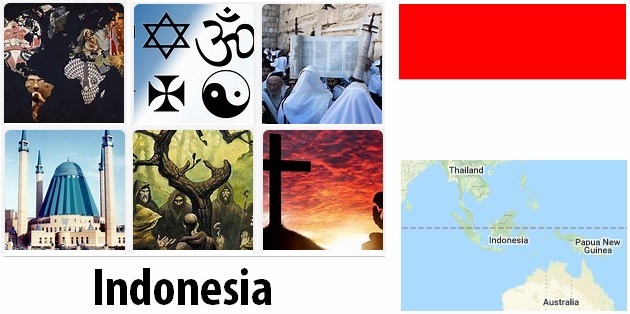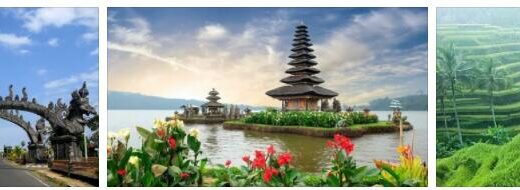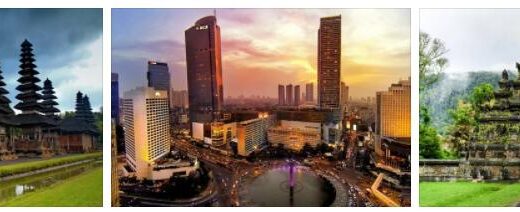Indonesia Religion
The constitution provides for religious freedom but at the same time states that the Republic of Indonesia rests on the idea of belief in a god. Atheism is not directly prohibited but is often viewed with great skepticism. There are six officially recognized religions: Hinduism, Buddhism, Islam, Catholicism, Protestantism and Confucianism. People who profess a different belief, such as the country’s many tribal religions, can register with the government as belonging to social – not religious – groups.
All citizens must register their religious affiliation with the authorities. The highest religious council of Indonesia has the task of advising the government on issues related to religious aspects of social life. The so-called blasphemy law that prohibits blasphemy has been criticized for helping to discriminate against people who do not belong to an official religion when the law is used against them.
Nearly 90 percent of the population professes to Islam. Indonesia is thus the world’s most populous Muslim nation. The vast majority of Muslims are Sunnis. Islam is widespread across the country but the practice varies depending on local traditions (adat). For example, the Muslim group Minangkabau on Sumatra has a matrilineal relationship (the relationship is based on the woman). In Java, Islam has been mixed with both Hindu-Buddhism and animism (religious belief) and ancient mysticism into a religion called the Kebatian, but officially classified as Islam. The Muslim faith has a particularly strong position in Aceh, where almost the entire population are Orthodox Muslims. Aceh is the only province where Muslim sharia courts are allowed (see Aceh), but also in other places, local decision makers have enacted laws or rules inspired by Sharia.
Christianity has its strongest foothold in eastern Indonesia, for example in Flores and the Moluccas, but also in Sulawesi. In Bali, almost the entire population professes to Hinduism, which has however been adapted to local customs. The country’s Chinese are generally Christians, Buddhists or Confucians.
- Countryaah: Population statistics for 2020 and next 30 years in Indonesia, covering demographics, population graphs, and official data for growth rates, population density, and death rates.
Population distribution
Indonesia’s population distribution is very uneven. Most of the 13,600 islands are uninhabited. 65% of the population of Indonesia live in Java and Bali, that is only 7% of the country’s area. Sumatra and Borneo, on the other hand, are only sparsely populated as outer islands.
Population development
The annual population growth of Indonesia is high. Currently 2%. The resulting overpopulation, especially in metropolitan areas, is the country’s main economic and political problem.
Even the Dutch colonial rulers tried to achieve an even distribution of the population through resettlement. The Transmigrasi project was set up in 1980 under President SUHARTO in order to reduce the “pressure” that is mainly on Java due to the steadily increasing population.
The project included the state-directed resettlement to the sparsely populated outer islands. The resettlement was also intended to balance the contrasts between the economically developed west and the less developed eastern parts of Indonesia.
However, the results of the project did little to ease the situation. In many cases, violent conflicts arose between the resettlers and the indigenous population, which, for example, became very bloody on Borneo. Even through measures for targeted family planning, the government was unable to permanently reduce the high birth rate in the country.
So the fight against population growth remains Indonesia’s biggest problem.
Population composition
The majority of the population in Indonesia is Indonesians. Papuans live in Irian Yaya, and 4 million people are of Chinese descent. The number of ethnic groups in Indonesia is around 360. More than 250 regional languages are spoken. However, Indonesian is the only official language, Javanese is spoken by around 70 million people.
This makes Indonesia a multi-ethnic state. The Islam is the connecting element. Over 85% of Indonesians are Muslim. Only the residents of Bali are predominantly Hindus.
Religious contradictions
The great majority of people are known for their ability to co-exist despite different beliefs. However, a series of ethnic / religious conflicts arose after the fall of President Suharto in 1998. The areas most severely affected were those where the balance between different religious groups changed through population movements, for example by moving Muslims into traditionally Christian regions. The years around the turn of the millennium began fierce fighting between Christians and Muslims in the Moluccas and Sulawesi (see Modern History). The mosque and church burns have been many over the years and still occur.
In recent years, fundamentalist Muslim groups have targeted violent campaigns against elements of society that they perceive as immoral or deviant from true doctrine, such as bars serving alcohol. Harassment and violence have also been directed at religious minorities, not least Christians, Shia Muslims and supporters of Ahmadiya (see below). One such ultra-conservative group is the Front to the Defense of Islam (Front Pembela Islam, FPI), which originated in the province of West Java but now exists in almost the entire country. Local authorities and police have been criticized for acting passively towards these groups. There are also Islamist terrorist groups that use violence in their struggle to make Indonesia a state ruled by Muslim Sharia law (see Militant Islamism).
Harassment of Ahmadiya
A particularly hard-hit minority is Muslim Ahmadiya in western Java. Ultra-Orthodox Muslims with FPI at the forefront perceive the community as repugnance to the right doctrine, as members believe that Ahmadiya’s founders have a prophet-like status. Several violent assaults have been directed at the group’s members, especially after 2008: mosques and schools have been burned down, and members have been forced to flee their homes after being harassed. The country’s highest religious council has wanted to ban Ahmadiya and in 2008 the government imposed a number of restrictions on the community. Among other things, its members risk up to five years in prison for “spreading non-Orthodox beliefs”. Many outside observers have perceived the government to be abusive towards the Muslim fundamentalists and have accused it of violating religious freedom.
In February 2011, three Ahmadiya supporters were murdered by a mob in western Java. Dozens of police officers were reported to have witnessed the murders without intervention. Critics later demanded that the government decision on stricter rules for Ahmadiya be revoked. Instead, the West Java provincial authorities imposed additional restrictions on the group. For example, members must take down signs at schools and mosques belonging to the group.
People who did not belong to Ahmadiya were encouraged to monitor what the community members were doing. In August 2011, an Ahmadiya member was sentenced to six months in prison for defending himself against the mob. Many of the perpetrators did not receive such severe punishment, and no one was convicted of murder.
Ahmadiya has been in Indonesia since 1925 or 1935, and has around 200,000 followers in the country. The conflict around the sect is considered to widen the already deep divide between Indonesia’s moderate and fundamentalist Muslims, since major manifestations have also been held in Ahmadiyya’s defense.
2013
November
Snowden: Yudhoyono eavesdropping Australia
Indonesia calls home its ambassador to Australia for consultations since media published information from American Edward Snowden that Australian intelligence service must have intercepted President Yudhoyono, his wife, the vice president and several Indonesian ministers. Australia regrets what happened but does not apologize. Yudhoyono says the disclosure damages relations between the two countries. As a result, Indonesia is suspending military cooperation with Australia, for example, operations against smuggling, joint military exercises and exchange of intelligence information. In Jakarta, a few hundred people march to the Australian embassy and burn Australian flags outside the building. Australian police and the country’s central bank have their websites hacked.
October
The President of the Constitutional Court suspected of bribery
The Constitutional Court Chairman Akil Mochtar is arrested on suspicion of bribery. He must have been taken into custody in his home when a businessman and a member of parliament handed over the equivalent of more than SEK 1.6 million to him to settle a dispute following a local election on Borneo in their favor. A suspicious bribe at such a high level is embarrassing for President Yudhoyono, who made the fight against corruption one of his profile issues. In the past year, his Democratic Party has been shaken by a series of corruption scandals.
September
Public apology from the Netherlands
The Netherlands publicly asks for forgiveness for all abuses that occurred during the Indonesian liberation war of 1945-1949 (see Older history). In the past, the Dutch government has apologized in individual cases and paid damages to selected people, but now it promises € 20,000 to all widows for men who were killed.
August
Indonesia buys combat helicopters from USA
The US sells eight Apache helicopters, worth a total of $ 500 million, to the Indonesian army. The United States will also provide training for military operations in Southeast Asia.
July
Regional meeting on the refugee crisis to be held
At a meeting in the city of Bogor, President Yudhoyono and Australian Prime Minister Kevin Rudd agree to hold a regional meeting to try to stem the growing stream of boat refugees from, for example, South Asia and Afghanistan via Indonesia to the Australian Christmas Island. Yudhoyono emphasizes the importance of countries of origin, transit and recipients having to attend the meeting.
Many dead in severe landslides
A major earthquake shakes the province of Central Aceh on Sumatra and leads to landslides. Thousands of people are losing their homes. More than 30 people are killed and hundreds injured. Six children are killed and 14 people get stuck under the masses when a mosque collapses.
June
Protests against more expensive fuel
After several weeks of debate, Parliament is voting for a revised budget, which significantly reduces state subsidies on petrol and diesel. As a result, gasoline prices in stores will rise by 44 percent and diesel by 22 percent, which particularly affects poor families. The measure is therefore combined with a cash contribution to around 15 million poor households. For four months, these households will receive the equivalent of US $ 15 monthly from the state. The decision is made because the subsidies are draining the Treasury, which has caused concern among the country’s important foreign investors. The price hikes lead to protests, including outside the Jakarta parliament building. Protests against price increases are sensitive to Indonesian politicians, as such demonstrations helped to topple President Suharto in 1998.
May
Yudhoyono visits Sweden
President Yudhoyono makes an official visit to Sweden. Both countries enter into several cooperation agreements, including environmental and urban planning.
Dozens of dead in mining accident
Twenty-eight miners perish when a tunnel in the Freeport Grasberg mine in Papua collapses. The rescue work is handled by the mining company, which states that ten people have been rescued.
Attempted attack on Myanmar’s embassy
As a result of inflated violence against Muslims in Myanmar (formerly Burma), the police arrest two men suspected of planning an explosive attack on the Myanmar embassy in Jakarta. The Muslim minority Rohingya is discriminated against in Myanmar and many members of the ethnic group have therefore chosen to flee to Muslim Indonesia.
March
The first execution since 2008 is executed
Indonesia is executing the first execution of a sentenced prisoner since 2008 when a Malaysian is being arched for heroin smuggling.
February
Party leaders are suspected of bribery
Anas Urbaningrum, chairman of the ruling Democratic Party, is banned from leaving the country because he is suspected of receiving bribes in connection with the Bogor stadium building (see December 2012).
January
The US reports Indonesia to the WTO
The US files a protest against Indonesia with the World Trade Organization WTO over Southeast Asian country’s import restrictions on garden and meat products. The US believes that Indonesia has recently increased import barriers.




